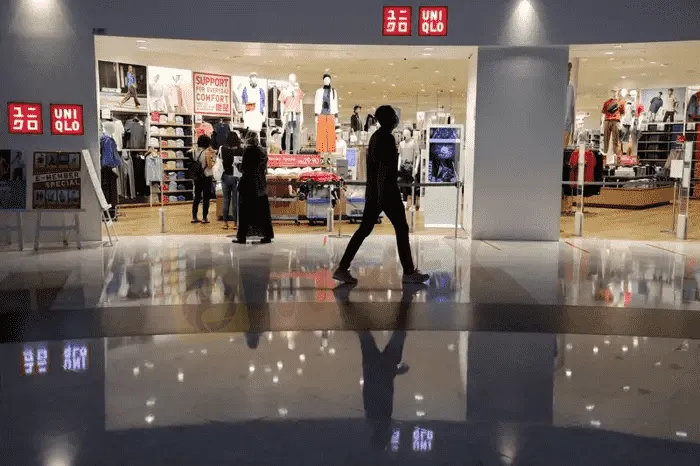简体中文
繁體中文
English
Pусский
日本語
ภาษาไทย
Tiếng Việt
Bahasa Indonesia
Español
हिन्दी
Filippiiniläinen
Français
Deutsch
Português
Türkçe
한국어
العربية
Uniqlo owner’s Q3 results to offer clues on China recovery, Japan inflation
Abstract:Japan’s Fast Retailing, home of Uniqlo, is expected to report quarterly profit grew 11% overall on Thursday, but investors’ focus will be on whether China is recovering and how domestic consumers are faring with inflation and the weak yen.

A bellwether for global retailers operating in China, Fast Retailing previously warned of a sharp decline in profit this year from its nearly 900 stores in the worlds no.2 economy. Still, it raised overall sales and profit forecasts to reflect strong demand in North America and Europe.
On Thursday, the company is expected to post an operating profit of 66.72 billion yen ($487 million) for its fiscal third quarter through May, according to an average of seven analysts forecasts from Refinitiv.
For the year ending August, the company expects earnings to climb 8.4% to 270 billion yen.
Uniqlo, known for affordable basics like socks and t-shirts, is popular in China and has not disavowed the use of Xinjiang cotton, unlike rivals including H&M, after allegations of forced labour in the region emerged in recent years.
“We believe the worst is behind us in China and this current quarter is ‘as bad as it gets’,” wrote Mark Chadwick, an analyst who publishes on the Smartkarma research platform.
Meanwhile, the U.S. market is projected to turn a profit for the first time, he added.
Results last week by Japanese retail giants Ryohin Keikaku Co, home of the Muji brand, and 7-Eleven convenience store owner Seven & i Holdings Co showed the diverging trends of major overseas markets.
Ryohin Keikaku reduced full-year forecasts, citing an uncertain outlook for mainland China. But Seven & i, which also runs Speedway convenience stores in the United States, lifted annual earnings estimates as the yen‘s decline to a 24-year low against the dollar boosts the value in Japanese currency terms of sales booked in the world’s biggest economy.
In Japan, meanwhile, the yens drop is adding to production costs and inflation. Fast Retailing chief executive Tadashi Yanai has railed that there is “absolutely no merit” to a weak yen.
The company said last month it would increase prices on its popular fleeces this autumn and warned that more hikes could be on the horizon.

Disclaimer:
The views in this article only represent the author's personal views, and do not constitute investment advice on this platform. This platform does not guarantee the accuracy, completeness and timeliness of the information in the article, and will not be liable for any loss caused by the use of or reliance on the information in the article.
Read more

Bank Negara Malaysia Flags 12 New Companies for Unauthorised Activity
Bank Negara Malaysia (BNM) has updated its Financial Consumer Alert List (FCA List) by adding 12 more entities, reinforcing its efforts to warn the public against unregulated financial schemes. Check if your broker made the list!

TradingView Brings Live Market Charts to Telegram Users with New Mini App
TradingView has launched a mini app on Telegram, making it easier for users to track market trends, check price movements, and share charts.

March Oil Production Declines: How Is the Market Reacting?
Oil production cuts in March are reshaping the market. Traders are closely watching OPEC+ decisions and supply disruptions, which could impact prices and future production strategies.

How to Calculate Leverage and Margin in the Forex Market
Leverage amplifies both potential profits and risks. Understanding how to calculate leverage and margin helps traders manage risks and avoid forced liquidation.
WikiFX Broker
Latest News
The Withdrawal Trap: How Scam Brokers Lure Victims into Paying More
FCA to Investors: Think Twice Before Trusting These Brokers
Trump\s tariffs: How could they affect the UK and your money
Trump gambles it all on global tariffs he\s wanted for decades
TradingView Brings Live Market Charts to Telegram Users with New Mini App
Trump tariffs: How will India navigate a world on the brink of a trade war?
IG Group Acquires Freetrade for £160M to Expand UK Investment Market
U.S. March ISM Manufacturing PMI Released
Should You Beware of Forex Trading Gurus?
Vanuatu Passes VASP Act to Regulate Crypto and Digital Assets
Currency Calculator







